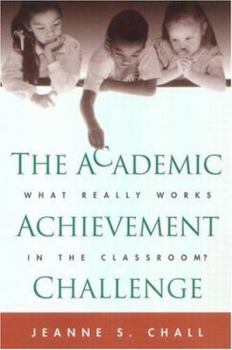The Academic Achievement Challenge: What Really Works in the Classroom?
Select Format
Select Condition 
Book Overview
This volume addresses one of the central issues in education: how best to instruct our students. From the late Jeanne S. Chall, Professor of Education at Harvard University and a leading figure in American education, the book reviews and evaluates the many educational reforms and innovations that have been proposed and employed over the past century. Systematically analyzing a vast body of qualitative and quantitative research, Chall compares achievement...
Format:Paperback
Language:English
ISBN:1572307684
ISBN13:9781572307681
Release Date:March 2002
Publisher:Guilford Publications
Length:210 Pages
Weight:0.75 lbs.
Dimensions:0.7" x 5.9" x 9.0"
Customer Reviews
3 ratings
What Practioners Already Know
Published by Thriftbooks.com User , 16 years ago
This text was a relatively quick read and it confirmed what I had learned in my teacher prepatory classes; however, it is the kind of belief system that some districts have steered away from in attempts to be more in touch with the emotional needs of students (this is not to say that meeting the emotional needs of the students isn't important, however, effort *can* equal achievement! It was in excellent condition; as well.
100 Years of Evidence that Real Teaching Works Best
Published by Thriftbooks.com User , 21 years ago
As other reviewers have noted, Jeanne Chall was passionately opinionated but also extremely well informed from her own decades of experience and research of educational methods. The evidence she presents in this book is wide-ranging, both historically and in subject matter. And her arguments as always are both rock-solid factual and heart-tuggingly persuasive. This is an excellent book that I would encourage as an appropriate and thoughtful gift for any educator.Parents who are concerned with getting the best education for their children should also read this book. Chall's language is less esoteric here than in her scholarly articles (although this is a scholarly book and her conclusions are consistent with those papers). She demonstrates here that educational methods and research are not too obscure for the general reader.In fact, her review of 100 years of research and experimentation shows that the common-sense notions held by the layman are correct -- that real teaching (instruction, direction, leadership, not just "guidance") works best to educate children. Chall explains why this is so, and shows the dire consequences of ignoring the facts.
Jeanne Chall's final word on the education debates.
Published by Thriftbooks.com User , 23 years ago
This is an important book because Chall endeavors to provide a historical and social context for understanding the debates about how best to teach the majority of children in schools. Chall invites educators, publishers, parents, and policy makers to look beyond the politics and trends in education, and to focus on the research evidence on what methods get results. She also calls for teacher training programs to empower teachers with the knowledge to examine and question the research they base their practice on. She advocates for using the past constructively to inform choices made in the future. She often said that doctors would never dream of prescribing a brand new treatment without researching past cures and treatments... and yet educators, she said, seemed to reinvent the same ideas over and over without considerating research evidence already gathered. It made her hopping mad. What is interesting to about this book is the story of it's evolution. Originally Chall drafted a very candid and straight forward manuscript based on the questions and opinions she had developed over 50 years as an educator. The book was going to be quite different from her well known scholarly publications. But then she kept rediscovering bits of newspaper and scraps from nagazines which she had piled away in vast personal collection of snippets -- all of which confirmed her thinking on what was going on in education. She became so excited about each interesting piece of evidence that including them became irresistable for her. But with each new snippet she then felt a need to address alternative viewpoints in order to try and offer a well rounded approach. Having been attacked in the past for her poignant views, I think she found it difficult (or maybe just stupid) to set herself for obvious criticisms. So what would originally have been a very personal argument based on her depth of experience in the field eventually evolved into a scholarly review of the historical evidence. This book -- completed during the last month's of her impressive life -- may not be her best work. But it is certainly her most personal. You just have to read between the lines.




